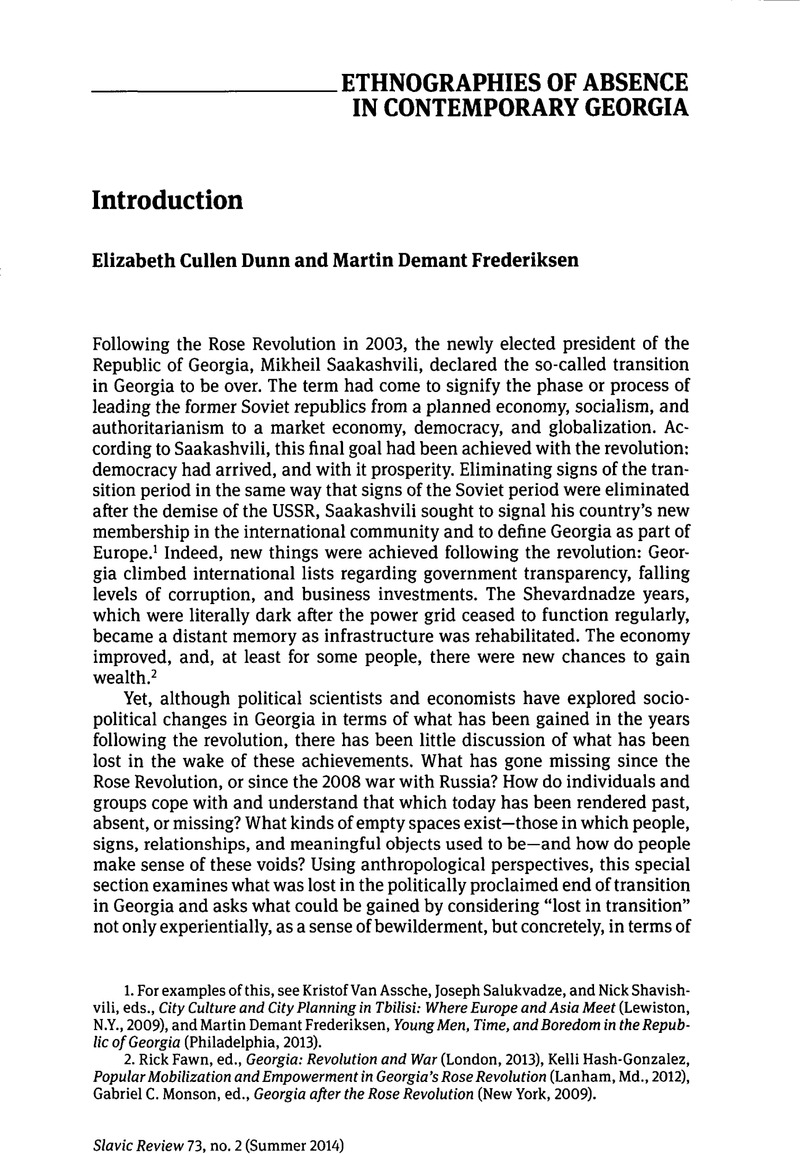Published online by Cambridge University Press: 20 January 2017

1 For examples of this, see Assche, Kristof Van, Salukvadze, Joseph, and Shavishvili, Nick, eds., City Culture and City Planning in Tbilisi: Where Europe and Asia Meet (Lewiston, N.Y., 2009)Google Scholar, and Frederiksen, Martin Demant, Young Men, Time, and Boredom in the Republic of Georgia (Philadelphia, 2013).Google Scholar
2 Fawn, Rick, ed., Georgia: Revolution and War (London, 2013)Google Scholar, Hash-Gonzalez, Kelli, Popular Mobilization and Empowerment in Georgia's Rose Revolution (Lanham, Md., 2012)Google Scholar, Monson, Gabriel C., ed., Georgia after the Rose Revolution (New York, 2009).Google Scholar
3 Cf. Ghodsee, Kristen, Lost in Transition: Ethnographies of Everyday Life after Communism (Durham, 2011)Google Scholar, Pedersen, Morten Axel and Højer, Lars, “Lost in Transition: Fuzzy Property and Leaky Selves in Ulaanbaatar,” Ethnos 73, no. 1 (March 2008): 73–96.CrossRefGoogle Scholar
4 Benjamin, Walter, “Theses on the Philosophy of History,” in Benjamin, , Illuminations: Essays and Reflections, ed. Arendt, Hannah, trans. Zohn, Harry (London, 1999), 249.Google Scholar
5 On this phantom pain, see Bille, Mikkel, Hastrup, Frida, and Sørensen, Tim Flohr, eds., An Anthropology of Absence: Materializations of Transcendence and Loss (New York, 2010).CrossRefGoogle Scholar On material or physical loss, see Frederiksen, , Young Men, Time, and Boredom, Gordon, Avery F., Ghostly Matters: Haunting and the Sociological Imagination (Minneapolis, 2008)Google Scholar, and Ivy, Marilyn, Discourses of the Vanishing: Modernity, Phantasm, Japan (Chicago, 1995).CrossRefGoogle Scholar
6 Quoted in David M. Herszenhorn,“Exiting President Reflects on Georgia,” New York Times, 18 November 2013, at http://www.nytimes.com/2013/ll/18/world/europe/georgia-president-takes-office.html?smid=pl-share(last accessed 5 February 2014). 7. Quoted in Jackson Diehl,“Georgia's Westward Course,” Washington Post, 24 November 2013, at http://www.washingtonpost.com/opinions/jackson-diehl-georgias-westward-course/2013/ll/24/52a89efO-5437-lle3-9e2c-eld01116fd98_story.html (last accessed 5 February 2014).